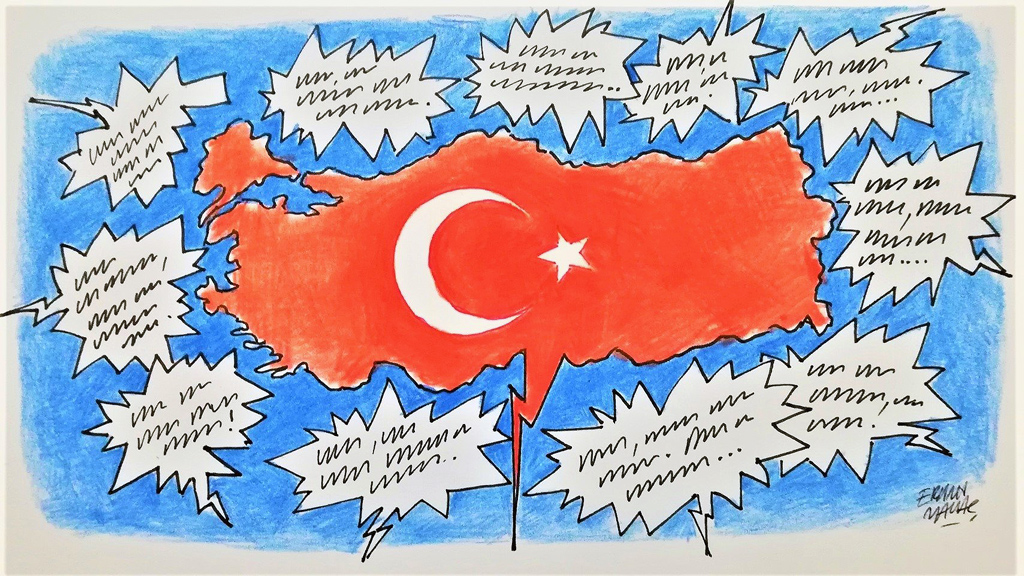The world’s eyes have been fixed on Nagorno-Karabakh, the rise of Islamophobia in Europe and the United States elections. As usual, all three battles have been fought with references to Turkey and President Recep Tayyip Erdoğan.
In Nagorno-Karabakh, Azerbaijan is in the process of liberating its occupied territories and glad to have tilted the balance of power in the South Caucasus with Turkey’s support. Armenia has been telling the world that it’s actually fighting Turkey – to no avail. At this rate, Nagorno-Karabakh could be an autonomous region within Azerbaijan’s borders soon.
At the same time, Russia finds itself compelled to accept Turkey’s involvement in diplomatic negotiations. Although recent airstrikes against Faylaq al-Sham fighters in Syria’s Idlib province may have been interpreted as a Russian attempt to counterbalance Ankara, the truth is Russian President Vladimir Putin appreciates his need to work with Erdoğan in Syria and the Caucasus alike.
As Azerbaijan’s president, Ilham Aliyev, rightfully observed, Turkey is the only country bordering all three South Caucasian nations.
To be clear, Turkey is actively involved in not just regional but also global issues. Ankara intends to remain part of those conversations, too. The driving force behind Turkey’s actions is the challenges of geopolitics and the responsibilities they entail – as opposed to ideology.
In other words, Turks could not run from those circumstances even if they wanted to. One way or another, every single issue in Europe, North Africa, the Eastern Mediterranean, the Middle East, the Black Sea, the Caucasus and Central Asia happens to be Turkey’s business.
Indeed, those issues are countless: Whether it’s the refugee crisis and the terror threat rooted in Syria and Iraq, the Iran sanctions, or the annexation of Jerusalem, Turkey just cannot ignore those developments. The conflict in the Caucasus, energy reserves in the Eastern Mediterranean and Islamophobia in Europe all shape Ankara’s foreign policy agenda.
Hence the lack of surprise when Turkey challenged French President Emmanuel Macron’s borderline Islamophobic policy. The world must view Erdoğan’s warning against “launching a fresh crusade” as the voice of Turkey, which is part of the Western and Islamic worlds at the same time. After all, acts of terrorism in Europe and the countless Muslims that European racists will drive out will be added to Turkey’s list of problems.
Those who fail to appreciate that fact keep asking why Turkey involves itself in each new debate. They must, however, get used to Ankara’s involvement since it stems from the new reality in our neighborhood. For the record, Turkey does not take initiative to solve nearly all international crises out of a thirst for adventure. It merely seeks to play an active role in the region’s issues.
Indeed, a major change is underway, though. Turkey, which the waves of crises and conflicts used to drown, now takes initiative as needed. The country also demonstrates its preparedness to use hard power if a certain issue cannot possibly be resolved with soft power. That is the bitter lesson learned in Turkey’s belated involvement in the Syrian civil war – and the rise of Daesh and PKK terrorism at its borders.
Ironically, Western governments seem to remember that Turkey hosts nearly 5 million Syrian refugees and an additional 4 million Syrians live in Turkish-controlled parts of Syria only when they wish to complain about “Erdoğan blackmailing Europe.”
Syria would not have enjoyed relative peace and quiet today had it not been for Ankara’s military activism. Nor would there have been a military balance of power in Libya, where a political transition is being negotiated. Likewise, the Eastern Mediterranean cannot emerge as a sea of peace and sharing unless Turkey’s interests are recognized.
Again, the Nagorno-Karabakh issue is closer to a resolution today than it has been in the last 30 years, when the world ignored Armenia’s war crimes and facilitated the occupation of Azerbaijani lands.
Here’s the bottom line: Vladimir Putin knows that there can be no order in the Eastern Mediterranean, the Black Sea, the Caucasus and the Middle East in Turkey’s absence. It would suit Western leaders, too, to accept the new reality in Ankara – which makes its moves without hesitation whenever a power vacuum emerges. In the wake of this week’s U.S. elections, Washington, too, will have to adapt to the geopolitical requirements of working with Turkey.
[Daily Sabah, 5 November 2020]
In this article
- Opinion
- Al Quds
- Armenia
- Armenian War Crimes
- Azerbaijan
- Azerbaijan-Armenia Conflict
- Azerbaijani President
- Caucasia
- Central Asia
- DAESH
- Daily Sabah
- Eastern Mediterranean
- Emmanuel Macron
- Europe
- European Union (EU)
- Fight Against Terror
- France
- French President
- Ilham Aliyev
- Iraq
- Islamic Republic of Iran
- Islamophobia
- Israel
- Jerusalem
- Karabakh
- Karabakh Conflict
- Kurdistan Workers' Party Terrorist Organization (PKK)
- Libya
- Middle East
- Palestine
- Recep Tayyip Erdoğan
- Russia
- South Caucasus
- Syria
- Turkish Foreign Policy
- Türkiye's Foreign Policy
- United States (US)
- Vladimir Putin
- War Crime
- Western World



